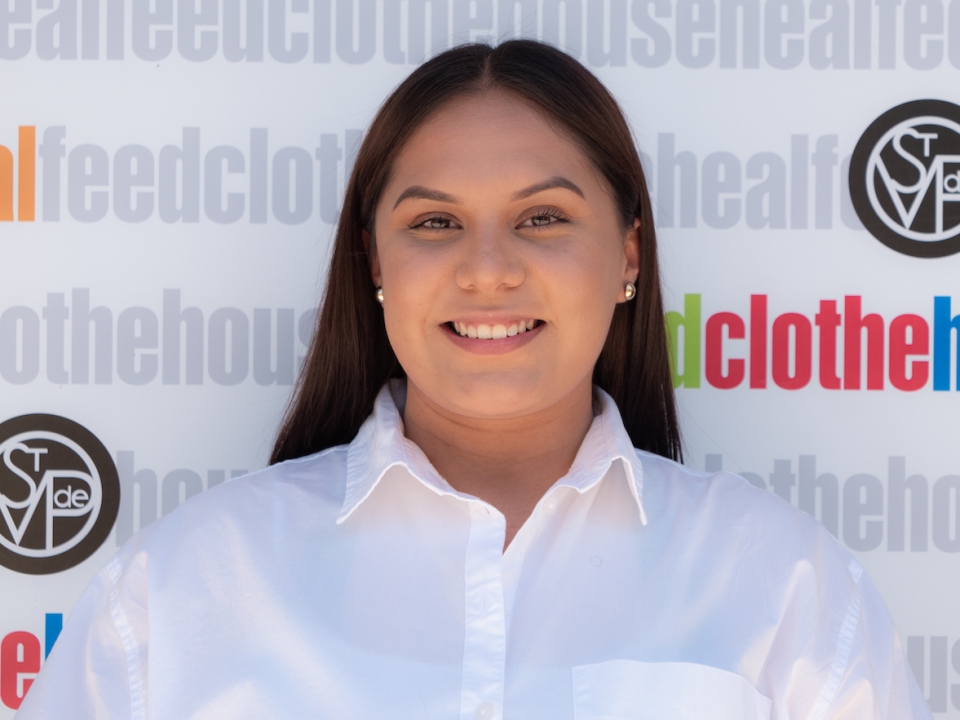According to Gabriel Shaibi, it was luck that brought him and Jocelyn Diaz Sanchez together in their work to prevent diabetes among high-risk and vulnerable populations, especially among Hispanic families, throughout the Valley.
Shaibi, an associate professor and Southwest Borderlands Scholar in Arizona State University's Edson College of Nursing and Health Innovation, was introduced to Diaz Sanchez, an interdisciplinary studies major at ASU, at an academic symposium where she was training families on healthier eating and lifestyles to prevent diabetes.
“She was not in any of my classes, but she was presenting and I learned about all this amazing work that she's doing with diabetes prevention and Hispanic families,” Shaibi said. “So I got to know who she was and always thought very highly of her.”
Her presentation showcased the work she does as a community health educator at Saint Vincent de Paul in a program called Every Little Step Counts, a community-based, family-centered diabetes prevention program focused on intervention, including nutrition, education and physical activity, that Shaibi and his team began in 2015. The program now includes a research component, which Diaz Sanchez supports.

Jocelyn Diaz Sanchez
RELATED: Exercise and education: Diabetes prevention work helps local Latino children, families
Serendipity would also have it that when Diaz Sanchez was 10 years old, she participated in Every Little Step Counts after she was diagnosed with prediabetes.
“My doctor at the time referred me over to St. Vincent where registered dieticians would offer nutrition education and tips on how to eat a more balanced meal and live a healthier life,” she said. “At the time, it was just me and my mom that would attend the classes.
“After that, I really took my health and my mental health seriously, and I was like ‘I need to work with other people. I need to spread this information. I need to help others.' Like, there's no way I'm gonna keep this to myself.’”
Now, 10 years later, Diaz Sanchez is leading those exact classes as a certified lifestyle coach through the National Diabetes Prevention Program, and is inspired to serve other Latino families who are at higher risk for Type 2 diabetes than people of non-Hispanic, white descent, according to the Centers for Disease Control.
“I am of course very passionate about everything that I do about helping my community,” she said. “Now I get to teach my community about how to be healthy.”
The impact Diaz Sanchez is making for local Hispanic families didn’t just get Shaibi’s attention. This spring, she was appointed as one of eight of her peers from across the U.S. to a diabetes prevention advisory board for the National Institutes of Health, where she and her counterparts will have direct input for holistic, inclusive research. Each of the advisory board members represent individuals with lived experience who can help inform research across 15 cities nationwide.
“Her dedication and commitment to ensuring that the community is best represented shows how she's serving as an advocate for bringing resources and building capacity,” Shaibi said.
For researchers, Shaibi said it is important that their studies don’t just give something to the communities impacted by diabetes, but to ensure their research encompasses and connects with communities in such a way that it includes students and individuals like Diaz Sanchez.
“It's a balance between the best academic work and the best community work. She embodies both of those. To me that's pretty special and pretty unique,” Shabi said.
This summer, Diaz Sanchez will travel to Washington, D.C., to convene with her peers on the advisory board and is interested in pursuing a master’s degree in public health.
“My real passion is in helping others, and health is the perfect place to be able to do that," she said. "I've come a long way, definitely.”
Top photo by Jorge Alcazar Narvaez via iStock
More Health and medicine

Creepy-crawly science that matters
Written by Douglas C. TowneWhen Karen Clark was a child traveling with her grandfather, the late ASU Professor Herbert L. Stahnke, she didn’t realize how unusual their evening routines were.“When we…

A new heart
Written by Daniel Oberhaus, ’15 BAEach year, around 1.3 million children are born with congenital heart disorders, malformations that can include missing chambers or misplaced vessels. It’s the most…

Beyond weight loss: Examining the social effects of GLP-1 medications
Glucagon-like peptide-1 receptor agonists, more commonly known as GLP-1 medications, have become ubiquitous in public discourse, with widespread focus on their weight-loss effects.But beyond changes…
